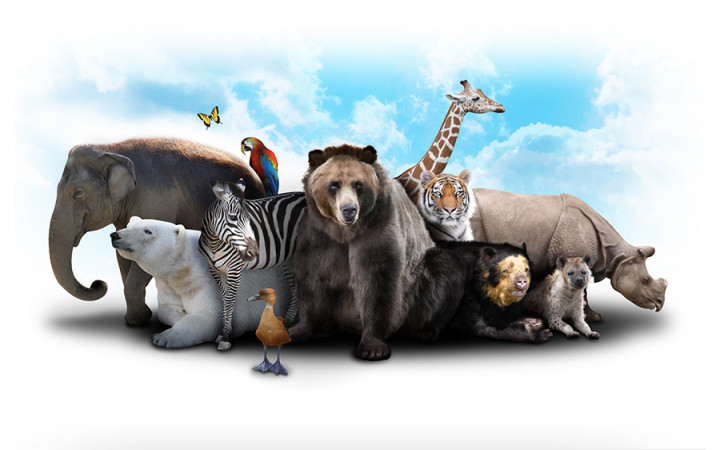Today’s Wonder of the Day was inspired by helaina from clearwater, FL. helaina Wonders, “How many animals are on earth?” Thanks for WONDERing with us, helaina !
We were hiking through the Wonderopolis jungle the other day on our way to the beach when we stopped to take a break under a big shade tree. We were about to close our eyes for a short siesta when we overheard a monkey and a sloth having an interesting conversation in the branches above us:
Monkey: Hey Sloth! Wake up! Did you know you can see all the way to the beach from up here?
Sloth: I'm awake, Monkey. Wow! Look at all the humans on the beach. What are they doing?
Monkey: They call it sunbathing. I don't get it. They just lie there on the sand and sweat.
Sloth: Why would they do that when they could nap in a nice, cool tree?
Monkey: They would need a lot of trees. Look at all of them! How many are there? Help me count. 1...2…3…4…no, wait, did I already count that one?
We couldn't nap with those two chattering above us, so we moved on down the path. Their conversation did make us WONDER about population, though. We already have an idea of how many humans there are on Earth, but we were curious about how many animals of all kinds there are in the world.
Unfortunately, that question doesn't have an easy answer. Scientists who have tried to answer it have only been able to come up with rough estimates that have a wide margin of error.
If you want to understand how difficult it is to get an accurate count of all the animals in the world, we have a challenge for you: count all the animals on the property you call home. This would include your house and the land that it sits on.
Start with the humans in your home. They're easy to count. If you have pets, those are easy to count, too. But there are so many more animals around you. Don't forget the birds and squirrels living outside your home. You also need to count the rabbits, raccoons, mice, and other creatures not easily seen during the day.
If you have a pond on your property, don't forget to count the fish! Finally, you must be sure to count the most populous group of animals in any area: insects. That means you need to count every ant, fly, and mosquito.
If you give this challenge a serious try, you will soon understand the problem that scientists who have considered this question face. There are simply so many animals to count and many of them are nearly impossible to track down or keep track of.
Some are too small to see, and others are in places too difficult to reach. There are even too many humans spread too far around the globe to ever know with precision exactly how many humans are on Earth at any particular time. That's why scientists tend to rely upon estimates to make educated guesses about populations.
Let's take a look at a few facts and figures that highlight the problem of trying to estimate how many animals there are in the world. First, we don't even know how many types of animals there are in the world, let alone how many individual animals there are.
Scientists have recently estimated that there are approximately 8.7 million species on Earth. They believe that 1-2 million of those species are animals. And what do we know about all those species? Not much! The same study estimates that 86% of all land species and 91% of all sea species have not yet been discovered or described!
Sticking to the species we do know about, let's look at some amazing numbers for particular groups of animals. Scientists believe there are over seven billion humans in the world today. That's a staggering number, but there are more chickens (over 18 billion) than humans. At least we humans do outnumber cattle (1.4 billion) and sheep (1.1 billion).
Those numbers pale in comparison to the insect world, though. For example, scientists estimate there are over 10,000 trillion ants alive at any one time. Based upon those numbers, some scientists estimate the total insect population at 10 quintillion, which is 10 billion billion! That figure has led at least one expert to estimate the total animal population on Earth to be about 20 quintillion, or 20 billion billion!





